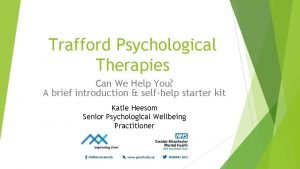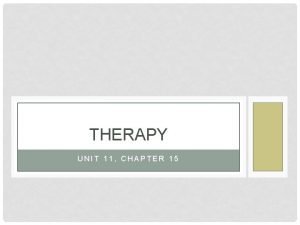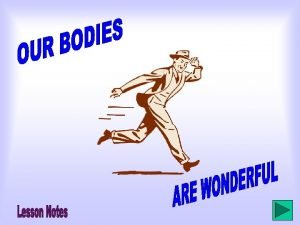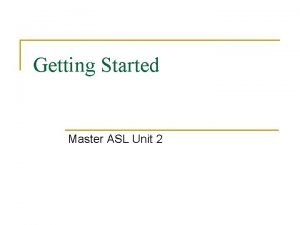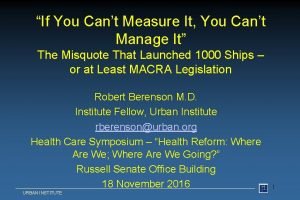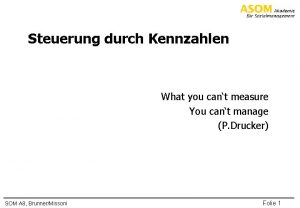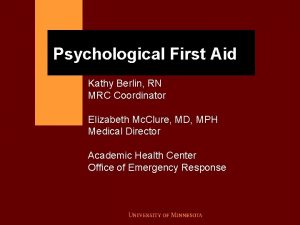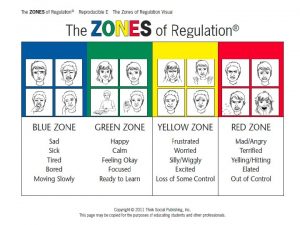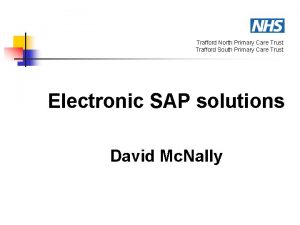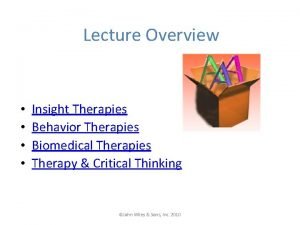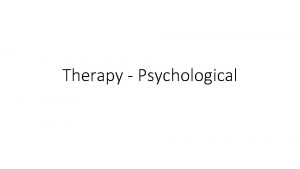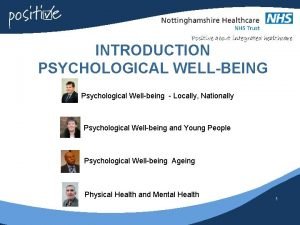Trafford Psychological Therapies Can We Help You A














- Slides: 14

Trafford Psychological Therapies Can We Help You? A brief introduction & self-help starter kit Katie Heesom Senior Psychological Wellbeing Practitioner

What is mental health? Mental health includes our emotional, psychological, and social well-being. It affects how we think, feel, and act. It also helps determine how we handle stress, relate to others, and make choices. Mental health is important at every stage of life, from childhood and adolescence through adulthood. (https: //www. mentalhealth. gov)

What causes mental health problems? Hormones Bullying Stress Money Exams Change Death/Loss Alcohol Self-image Upbringing Family Issues Abuse Drugs Caring responsibilities Illness Adoption Sometimes there is NO cause…they just happen

Trafford Psychological Therapies Work With: Stress OCD (Obsessive Compulsive Disorder) Sleep issues Panic Bullying Anger Health Anxiety Generalised Anxiety Disorder (Worry) Depression Phobias Social Anxiety Low self – esteem Exam/ school pressure PTSD (Post Traumatic Stress Disorder) For issues that we do not work with we can often help you find a service that can support you Self-harm

What we offer… Low intensity Cognitive Behavioural Therapy (e-therapy or face-to-face) High intensity Cognitive Behavioural Therapy Counselling Psychology Drop in groups from Self Help Services

What is therapy? Non-judgemental Listened to Understood ► Advice giving Validated ► Life long Encouraged ► A passive process Motivated to recover ► For alcohol/drug support Helping you to help yourself ► Lying on a sofa being analysed! One-to-one Weekly/Fortnightly appointments Daytime and evening clinics Can be over the telephone What therapy is not:

Self-Help: Anxiety & Depression Physical Symptoms: Acne Tiredness/Low Energy IBS/using the toilet more regularly Tight chest/Chest Pain Heart racing Trembling/Shaking Breathlessness Appetite changes Butterflies Pins & Needles Numbness Sweating Hot Red Sleep changes Indigestion Migraines Light headed Reduced socialising Not engaging with hobbies Isolation Concentration changes Tension

Self-Help: Anxiety & Depression Psychological Symptoms: Negative thought patterns Self-criticism/pressure Overthinking Reduced pleasure from activities Thoughts/urges to self-harm/end your life Feelings of hopelessness Worry Feeling bad about yourself Isolation/withdrawal from others

Self-Help: Managing Stress (and change) Stress: a perceived inability to cope in a situation. Time management Balance of activities – Achievement/Pleasure Prioritising Sleep Exercise Diet (including caffeine/ alcohol) Self-care

Self-Help: Worry is a natural part of life and not a mental health difficulty in its own right. When we are unable to control it we can feel anxious and this can cause us to worry more. Recognising when worry is becoming unhealthy and unhelpful is vital. Tips & Techniques: It can be helpful to allocate time to worry in some circumstances. (CCI postponing worry). Write down your worries and problem solving. Distraction – having too much time to worry is also a problem! Sharing your worries with someone else. Normal or excessive/prolonged worry?

Self-Help: Resilience Acknowledging our own resilience skills can be vital for managing present and future situations. Reflect on any difficult situations/change/distress you may have already experienced in your life: - Making new friends - Starting a new school/sixth form - Moving house - Exams - Relationships - Loss - Family issues - Ill health/injury How did you get through these times? What skills did you use? Can you use/build on these skills in the future? What did you do well? What would you like to do differently in the future? What support networks do you have?

Self-Care Self-talk – how do you talk to yourself? Expectations/Pressure – what expectations/rules do you have for yourself? How much pressure do you put on yourself? Self-care – what do you do to look after yourself? Is there anything else you could do? Healthy eating/drinking Exercise regularly Managing setbacks – being reflective not critical Self-compassion Connecting with others (in person, on the phone, video calls, games…even chatting to the person on the checkout at the supermarket!) 5 Ways to Wellbeing: https: //www. nhs. uk/conditions/stress-anxiety-depression/improvemental-wellbeing/ (connection, physical activity, learning new skills, giving, mindfulness)

What our clients have said recently…

We’re here to help! Trafford Psychological Therapies: You need to have a Trafford GP. You can refer through your GP or you can self refer through our website: Website: WWW. GMMH. NHS. UK/TPT Resources: • Apps – Stay Alive/Calm Harm • Helplines – Samaritans 116 123 - Sane. Line 0300 034 7000 - GMMH crisis line 0800 953 0285 - Shout! 24/7 free text service 85258 • Online support – Kooth, Qwell • A&E/Urgent Care Centre Tel Number: 0161 357 1350 Questions?
 Trafford psychological therapies
Trafford psychological therapies Iapt trafford
Iapt trafford Trafford psychological therapies
Trafford psychological therapies Trafford psychological therapies
Trafford psychological therapies Psychodynamic vs psychoanalytic
Psychodynamic vs psychoanalytic If you think you can you can poem
If you think you can you can poem Freesurfer troubleshooting
Freesurfer troubleshooting Help us help you
Help us help you Master asl unit 2
Master asl unit 2 If you can imagine it you can achieve it
If you can imagine it you can achieve it We cannot manage what we cannot measure
We cannot manage what we cannot measure If you can't measure it, you can't manage it
If you can't measure it, you can't manage it If you don't measure it you can't manage it
If you don't measure it you can't manage it You can't manage what you can't measure bedeutung
You can't manage what you can't measure bedeutung Kathy berlin
Kathy berlin
